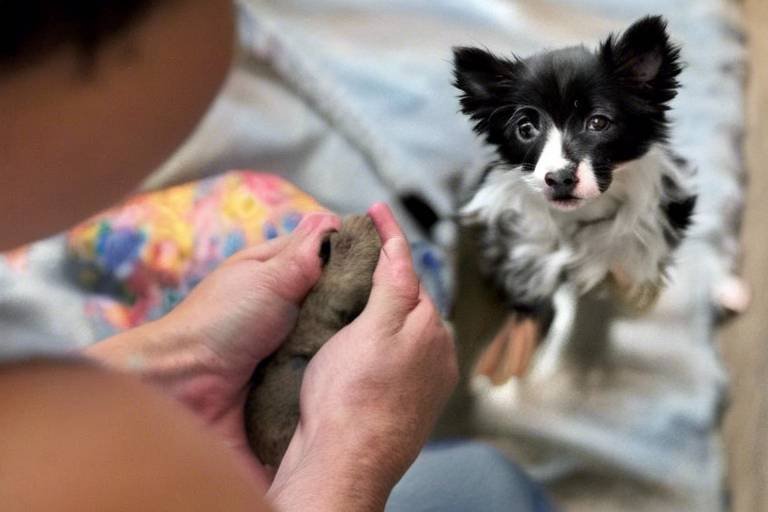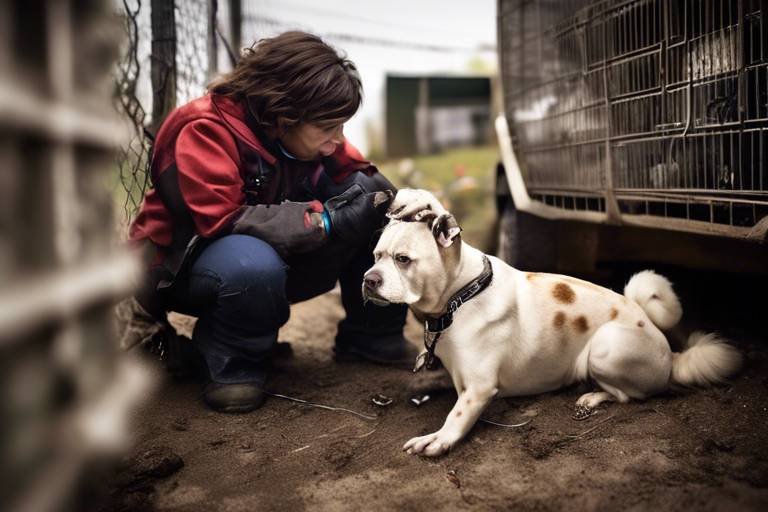The Impact of Animal Rescues on Community Health
Animal rescues play a vital role in enhancing community health in ways that extend beyond simply saving animals. These organizations not only provide a safe haven for abandoned and abused pets but also foster a sense of community, promote mental well-being, and encourage social responsibility among residents. Imagine walking into a local animal rescue and feeling an immediate sense of warmth and connection. It's not just about the furry friends waiting for adoption; it’s about the people coming together for a common cause. This article delves into how animal rescues positively influence community health through emotional support, social cohesion, and public awareness, while also addressing the myriad challenges these organizations face in their noble mission.
Animals are more than just pets; they are companions that provide significant emotional support. Studies have shown that interacting with animals can reduce stress and anxiety levels, which is crucial in today’s fast-paced world. When individuals adopt a rescue animal, they often experience a surge of unconditional love and companionship that can alleviate feelings of loneliness and depression. The bond formed between humans and animals is unique and profound, often described as a lifeline during tough times. For many, coming home to a wagging tail or a soft purr can make all the difference in their mental health.
Animal rescues serve as community hubs, bringing together individuals from various backgrounds and fostering social connections. They often host events, adoption drives, and educational workshops that encourage residents to engage with one another. This interaction promotes a sense of belonging and strengthens neighborhood ties. Volunteering at an animal rescue not only allows individuals to contribute to a worthy cause but also connects them with like-minded people who share a passion for animal welfare. The friendships formed in these environments can lead to a more cohesive and supportive community.
Volunteering at animal rescues is a fantastic way to build a sense of community while making a positive impact. Whether it’s walking dogs, cleaning cages, or participating in fundraising events, volunteers are crucial to the operation of these organizations. They come together, sharing their experiences and skills, which fosters camaraderie. In fact, many volunteers report feeling a greater sense of purpose and fulfillment through their work at rescues, which in turn enhances their overall well-being.
Animal rescues can also stimulate the local economy. By attracting visitors and potential adopters, these organizations can boost foot traffic in the area. Events hosted by rescues often draw significant crowds, benefiting local businesses such as pet supply stores, cafes, and restaurants. Moreover, as these rescues grow, they create jobs, from veterinary positions to administrative roles, contributing to the economic stability of the community.
Many animal rescues offer educational programs that promote responsible pet ownership and raise awareness about animal welfare. These initiatives help foster a sense of responsibility within the community. By educating residents on topics such as spaying and neutering, proper pet care, and the importance of adopting rather than shopping, rescues play an essential role in shaping a more informed and compassionate society.
Animal rescues often collaborate with local health services to address public health issues. For instance, they may partner with mental health organizations to provide therapy animals for those in need. These partnerships not only enhance the services offered by health professionals but also highlight the importance of animal companionship in promoting overall community well-being. The synergy created through these collaborations can lead to innovative solutions for improving public health.
Despite their numerous benefits, animal rescues face significant challenges, including funding and resource limitations. Many rely on donations and grants to operate, making financial stability a constant concern. Without adequate funding, rescues struggle to provide necessary services, care for animals, and maintain facilities. This section will explore some of the obstacles that these organizations encounter in their mission to support both animals and the communities they serve.
Sustainable funding is crucial for the success of animal rescues. Many organizations employ various strategies to secure financial support, such as fundraising events, online campaigns, and partnerships with local businesses. Effective resource management is also essential, as rescues must balance their budgets while ensuring that animals receive the care they need. Challenges in this area can lead to difficult decisions, affecting the quality of care provided to animals and the services offered to the community.
Animal rescues must navigate complex legal and regulatory landscapes. Compliance with local, state, and federal laws can be daunting, and failure to meet these requirements can result in severe penalties. These issues can affect rescue operations and community health initiatives, as organizations may need to divert resources to address legal concerns instead of focusing on their mission. Understanding and managing these challenges is critical for the continued success of animal rescues.
- How can I get involved with my local animal rescue? Many rescues welcome volunteers and donations. Check their websites for opportunities!
- What are the benefits of adopting from a rescue? Adopting from a rescue not only saves a life but also supports the community and promotes responsible pet ownership.
- Are there age restrictions for volunteering? Most rescues have specific age requirements, but many allow younger volunteers to participate with adult supervision.
- How do animal rescues contribute to community health? They provide emotional support, foster social connections, and promote public awareness about animal welfare.

Emotional Benefits of Animal Companionship
When we think about our furry friends, it’s easy to overlook the profound emotional benefits they bring into our lives. Animals have an incredible ability to connect with us on a level that often transcends human interaction. They offer a unique form of companionship that can help alleviate feelings of loneliness and provide a sense of purpose. Imagine coming home after a long day, feeling drained and stressed, only to be greeted by a wagging tail or a gentle purr. This simple act can instantly lift your spirits, reminding you that you are loved unconditionally.
Studies have shown that spending time with pets can significantly reduce stress and anxiety. The act of petting a dog or cat has been scientifically proven to lower cortisol levels, the hormone responsible for stress. Furthermore, the presence of an animal can trigger the release of oxytocin, often referred to as the "love hormone," which enhances feelings of happiness and bonding. This emotional support is particularly important for individuals dealing with mental health issues, such as depression or anxiety disorders.
Animal rescues play a pivotal role in this dynamic. By providing homes for abandoned or neglected animals, they not only give these creatures a second chance but also offer a source of comfort and companionship to the community. Many people find solace in adopting pets from rescues, as these animals often come with a story of resilience that resonates deeply with their new owners. It creates a bond that is built on shared experiences of overcoming adversity.
Moreover, the emotional benefits of animal companionship extend beyond just the individual. When people come together to support local rescues, whether through adoption, volunteering, or donations, they foster a sense of community. This collective effort can lead to stronger social ties and a shared commitment to animal welfare. Engaging with animal rescues not only enriches the lives of the animals but also enhances the emotional well-being of the community as a whole.
In summary, the emotional benefits of animal companionship are immense. From reducing stress and anxiety to fostering community connections, the presence of animals in our lives can create a ripple effect that enhances overall well-being. By supporting animal rescues, we not only help the animals but also contribute to a healthier, happier community.

Social Cohesion and Community Engagement
Animal rescues are more than just shelters; they are vibrant community hubs that foster social connections among residents. When people come together for a common cause—like saving animals—they build relationships that transcend typical neighborhood interactions. Imagine walking into a local animal rescue and being greeted by a warm smile from a fellow volunteer, both of you sharing a passion for helping those in need. This sense of belonging is what makes animal rescues a vital part of community life.
These organizations often host events that draw in community members, from adoption days to fundraising activities. Such events not only raise much-needed funds but also serve as a platform for residents to engage with one another. Picture a sunny Saturday filled with laughter, families playing with dogs, and people sharing stories about their own pets. It’s a beautiful tapestry of interactions that strengthens neighborhood ties. In fact, many rescues report that their events lead to lasting friendships among attendees, creating a network of support that extends beyond the shelter's walls.
Moreover, volunteering at animal rescues provides individuals with an opportunity to connect with others who share similar interests. When people work side by side, whether it’s cleaning cages or organizing an adoption event, they develop camaraderie. This shared experience can be incredibly fulfilling, as volunteers often leave feeling a sense of achievement and community. According to a recent survey, over 70% of volunteers at animal rescues reported feeling more connected to their community after participating in rescue activities.
In addition to fostering personal connections, animal rescues play a significant role in promoting volunteerism. Many rescues rely heavily on volunteers to operate effectively, and in turn, they provide these individuals with valuable experiences that can enhance their skills and resumes. Opportunities range from hands-on animal care to administrative tasks, catering to various interests and abilities. This engagement not only helps the rescues but also empowers volunteers, making them feel like active contributors to their community.
Furthermore, the impact of animal rescues on community engagement is evident through their educational programs. Many rescues offer workshops and seminars that educate the public on responsible pet ownership and animal welfare. By raising awareness about these important topics, rescues encourage community members to take responsibility for their pets and advocate for animal rights. This kind of education fosters a sense of collective responsibility, creating a community that is not only informed but also compassionate.
In summary, animal rescues are instrumental in enhancing social cohesion and community engagement. They create environments where people can connect, learn, and grow together. The emotional bonds formed in these spaces extend beyond the animals themselves, enriching the lives of the community members involved. So, the next time you think about visiting a local animal rescue, remember that you’re not just helping animals; you’re also contributing to the fabric of your community.
Volunteer Opportunities and Community Building
Volunteering at animal rescues isn't just about helping furry friends; it's also about building a vibrant community. When you step into a rescue organization, you’re not just signing up for a task; you’re joining a family of like-minded individuals who share a passion for animal welfare. This shared interest creates a unique bond among volunteers, fostering friendships that often extend beyond the shelter walls. Have you ever thought about how a simple act of kindness can ripple through a community? Well, volunteering does just that!
When people come together to support a common cause, it sparks a sense of belonging and purpose. Animal rescues often host events such as adoption days, fundraisers, and community outreach programs. These gatherings not only provide essential services but also offer opportunities for volunteers to engage with the community. Imagine attending a local fair where you can adopt a pet, learn about responsible pet ownership, and meet your neighbors—all in one day! Such events help to strengthen the social fabric of the community.
Moreover, volunteering can be a transformative experience. It allows individuals to develop new skills, from animal care to event planning, which can be invaluable in both personal and professional realms. Here are a few key benefits of volunteering at animal rescues:
- Skill Development: Volunteers often learn about animal care, public speaking, and teamwork.
- Networking Opportunities: Meeting fellow animal lovers can lead to lasting friendships and professional connections.
- Community Awareness: Volunteers become ambassadors for animal welfare, spreading awareness and educating others.
In essence, volunteering at animal rescues is a two-way street. While volunteers provide much-needed help, they also receive a wealth of benefits that contribute to their personal growth and community involvement. It's a beautiful cycle of giving and receiving that enhances not just the lives of animals but also the humans who care for them.
So, if you’re looking to make a difference, consider reaching out to your local animal rescue. You might find that the experience is just as rewarding for you as it is for the animals you help!
Impact on Local Economy
Animal rescues play a surprisingly significant role in boosting the local economy, acting as vibrant hubs that attract both residents and visitors alike. Think about it: when people come together to support these organizations, they bring with them not just their love for animals but also their wallets. This creates a ripple effect that benefits various sectors of the community. For instance, local businesses such as pet supply stores, veterinary clinics, and even cafes see an uptick in sales as more people engage with animal rescue activities.
Moreover, these rescues often host events that draw crowds, such as adoption days, fundraising galas, and community fairs. These events not only raise much-needed funds for the rescues but also encourage attendees to explore nearby shops and eateries. This is where the magic happens—small businesses thrive when the community rallies around a cause. Just picture a bustling Saturday afternoon filled with families enjoying food trucks while their kids pet adoptable puppies. It's a win-win situation!
Furthermore, animal rescues can create job opportunities, ranging from full-time positions in management and veterinary care to part-time roles for volunteers and interns. These jobs not only provide income but also help individuals gain valuable experience in animal care, customer service, and nonprofit management. As a result, the local economy becomes more robust, with an increase in both employment and consumer spending.
To illustrate the economic impact of animal rescues, consider the following table that outlines some key benefits:
| Benefit | Description |
|---|---|
| Increased Foot Traffic | Events hosted by rescues attract visitors to local businesses, boosting sales. |
| Job Creation | Animal rescues provide employment opportunities, enhancing local job markets. |
| Community Engagement | Rescues foster a sense of community, encouraging residents to support local initiatives. |
In summary, the impact of animal rescues on the local economy is profound. By fostering connections among community members and encouraging spending at local businesses, these organizations not only save lives but also help to create a thriving economic environment. So, the next time you think about supporting an animal rescue, remember that your contribution goes far beyond just helping furry friends—it extends to uplifting the entire community.
- How do animal rescues benefit the local economy? Animal rescues attract visitors, create jobs, and encourage spending at local businesses.
- What types of events do animal rescues typically host? They often host adoption events, fundraising galas, and community fairs that engage the public.
- Can volunteering at an animal rescue help my career? Yes! Volunteering can provide valuable experience in various fields, including animal care and nonprofit management.
Educational Programs and Awareness Campaigns
Animal rescues play a crucial role in educating the public about responsible pet ownership and the importance of animal welfare. Through various educational programs and awareness campaigns, these organizations not only advocate for the animals they save but also empower the community with knowledge that can lead to better treatment and understanding of pets. Imagine walking into a community center where a friendly volunteer shares insights on how to care for your furry friends—this is the kind of environment that animal rescues create.
One of the most impactful ways animal rescues engage with the community is through workshops and seminars. These events often cover a range of topics, such as:
- Basic pet care and training
- Understanding animal behavior
- Health and nutrition for pets
- Spaying and neutering benefits
By providing this valuable information, rescues help to reduce the number of abandoned and neglected animals. When people are informed about the responsibilities that come with pet ownership, they are more likely to make thoughtful decisions. This proactive approach not only benefits the animals but also enhances the overall health of the community.
Additionally, many rescues implement awareness campaigns that highlight the plight of homeless animals. These campaigns often utilize social media, local events, and partnerships with schools to spread the message far and wide. For instance, a campaign might feature heartwarming stories of rescued animals, showcasing their journeys from abandonment to loving homes. This not only raises awareness but also encourages community members to adopt rather than shop for pets.
Moreover, educational programs often include collaborations with local schools. By introducing children to the concepts of empathy and responsibility towards animals, rescues foster a generation that values animal welfare. Programs might include:
- School visits with therapy animals
- Art contests centered around animal themes
- Interactive sessions on pet care
Through these initiatives, children learn the importance of treating animals with kindness and respect, which can lead to more compassionate adults. The ripple effect of these educational efforts can be profound, positively influencing community attitudes towards animals for years to come.
In summary, the educational programs and awareness campaigns spearheaded by animal rescues are vital for nurturing a community that values and protects its animals. By equipping individuals with knowledge and resources, these organizations not only save lives but also promote a healthier, more informed society.
1. What types of educational programs do animal rescues offer?
Animal rescues typically offer workshops on pet care, training, and responsible ownership, as well as school programs that educate children about animal welfare.
2. How can I get involved in these educational initiatives?
You can volunteer at local rescues, participate in their events, or even help spread the word through social media.
3. Are these programs free to attend?
Many animal rescues offer free or low-cost programs to ensure accessibility for all community members.
4. How do these programs benefit the community?
They promote responsible pet ownership, reduce animal neglect and abandonment, and foster a culture of empathy and respect towards animals.
Collaboration with Local Health Services
Animal rescues are not just about saving furry lives; they play a crucial role in promoting overall community health through strategic partnerships with local health services. These collaborations can lead to innovative solutions for public health issues, benefiting both animals and humans alike. Imagine a world where your local animal shelter is not only a haven for abandoned pets but also a hub for health initiatives that address mental wellness, disease prevention, and community engagement. Sounds fantastic, right?
One of the key areas where animal rescues and health services join forces is in the realm of mental health support. Numerous studies have shown that interacting with animals can significantly reduce stress, anxiety, and depression levels. By partnering with mental health professionals, animal rescues can facilitate programs that utilize therapy animals to aid individuals struggling with mental health issues. For instance, community workshops that incorporate animal therapy can provide participants with a unique way to cope with their challenges, fostering emotional resilience.
Moreover, these collaborations often extend to public health campaigns aimed at preventing zoonotic diseases—those diseases that can be transmitted from animals to humans. By working together, animal rescues and health services can educate the community on responsible pet ownership and the importance of vaccinations. This awareness not only protects the health of pets but also enhances the well-being of the entire community. For example, local health departments might sponsor free vaccination clinics at animal rescues, ensuring that pets receive necessary medical care while also educating pet owners about the importance of preventive health.
Another fascinating aspect of this collaboration is the potential for data sharing. Local health services can gain valuable insights into community health trends by analyzing data collected from animal rescues, such as the prevalence of certain breeds or the health conditions of rescued animals. This information can be instrumental in shaping public health policies and interventions. In return, animal rescues can benefit from the health services’ expertise in managing health crises, ensuring that they are equipped to handle any potential public health challenges that may arise.
In summary, the collaboration between animal rescues and local health services is a win-win situation. It not only addresses immediate health concerns but also fosters a sense of community responsibility and engagement. Together, they create a ripple effect that enhances the quality of life for both animals and humans, making our neighborhoods healthier and more vibrant places to live.
- How do animal rescues collaborate with health services?
Animal rescues partner with health services to provide mental health support, conduct public health campaigns, and share data for community health insights. - What are the benefits of therapy animals?
Therapy animals can help reduce stress, anxiety, and depression, providing emotional support to individuals in need. - How can I get involved in my local animal rescue?
You can volunteer, donate, or participate in community events organized by local rescues to support their initiatives.

Challenges Faced by Animal Rescues
While animal rescues play a vital role in improving community health and well-being, they face numerous challenges that can hinder their mission. One of the most significant hurdles is securing adequate funding. Many rescues operate on tight budgets, relying heavily on donations, grants, and fundraising events. Unfortunately, the competition for these funds is fierce, and many organizations struggle to meet their financial needs. This lack of resources can limit their ability to provide essential services, such as veterinary care, food, and shelter for the animals in their care.
Additionally, animal rescues often grapple with resource management. Efficiently managing volunteers, supplies, and facilities requires a high level of organization and planning. Without proper management, rescues can quickly become overwhelmed, leading to burnout among staff and volunteers. The emotional weight of caring for abandoned or abused animals can take a toll on the mental health of those involved, making it crucial for rescues to implement support systems for their team members.
Another challenge is navigating the legal and regulatory landscape. Animal rescues must comply with various local, state, and federal laws, which can be complex and ever-changing. This includes licensing requirements, health regulations, and zoning laws. For instance, some areas may have restrictions on the number of animals that can be housed in a facility, which can limit a rescue's capacity to save more lives. Compliance with these regulations not only requires time and effort but also financial resources that can be in short supply.
Moreover, animal rescues often face public perception issues. Some individuals may not fully understand the mission of these organizations or may hold negative stereotypes about animal welfare efforts. This can lead to a lack of community support or even hostility towards rescues. To combat this, many rescues engage in educational outreach to inform the public about their work and the importance of animal welfare. Such initiatives are crucial for fostering a positive image and building community trust.
Despite these challenges, animal rescues continue to make a profound impact on community health. By addressing the obstacles they face, these organizations can enhance their effectiveness and reach even more individuals in need. The road may be rocky, but the rewards—both for the animals and the communities they serve—are undeniably worth the effort.
- What are the main challenges faced by animal rescues?
Animal rescues primarily struggle with funding, resource management, legal compliance, and public perception.
- How can communities support local animal rescues?
Communities can support rescues through donations, volunteering, and participating in educational programs.
- Why is funding so crucial for animal rescues?
Funding is essential as it directly impacts the rescue's ability to provide care, shelter, and medical assistance to animals in need.
Funding and Resource Management
Funding and resource management are critical lifelines for animal rescues, enabling them to operate effectively and fulfill their missions. Without a steady stream of financial support, many of these organizations would struggle to provide the essential services that not only save animals but also contribute to community well-being. Many rescues rely heavily on donations, grants, and fundraising events to keep their doors open. However, the challenge lies in ensuring that these funds are not only acquired but also managed efficiently.
To tackle the financial hurdles, animal rescues often implement a variety of strategies. For instance, they may organize fundraising events like charity walks, auctions, and community fairs. These events do not just raise money; they also raise awareness about the importance of animal welfare. But it doesn't stop there! Many organizations are now turning to digital platforms to reach a wider audience. Crowdfunding campaigns on social media can attract small donations from a large number of supporters, creating a substantial impact.
Additionally, forming partnerships with local businesses can be a win-win situation. For example, businesses might sponsor events or provide in-kind donations, such as food or supplies, in exchange for marketing opportunities. This not only helps rescues reduce costs but also promotes community involvement and local commerce. Here’s a quick look at some common funding sources for animal rescues:
| Funding Source | Description |
|---|---|
| Private Donations | Individual contributions from community members and animal lovers. |
| Grants | Financial support from government bodies or private foundations aimed at specific projects. |
| Fundraising Events | Community events that raise both funds and awareness for animal welfare. |
| Corporate Sponsorships | Partnerships with local businesses that provide financial or material support. |
Furthermore, effective resource management is just as crucial as securing funding. Animal rescues must prioritize their spending to ensure that every dollar is used wisely. This might involve budgeting for essential veterinary care, food, and shelter while also setting aside funds for unexpected emergencies. Many organizations adopt a transparent financial model, allowing donors to see how their contributions are being utilized. This transparency builds trust and encourages continued support.
In conclusion, while the road to sustainable funding and resource management is often fraught with challenges, animal rescues can navigate these obstacles through creativity, community engagement, and a commitment to transparency. By cultivating strong relationships with donors and local businesses, these organizations can secure the resources they need to thrive, ultimately benefiting both the animals in their care and the communities they serve.
- How can I help my local animal rescue? You can volunteer, donate, or attend fundraising events to support your local rescue.
- What types of animals do rescues typically help? Most rescues focus on cats and dogs, but some also help other animals like rabbits, birds, and reptiles.
- Are donations to animal rescues tax-deductible? Yes, most animal rescues are registered non-profit organizations, making your donations tax-deductible.
Legal and Regulatory Issues
Animal rescues play a vital role in enhancing community health, but they often find themselves navigating a complex web of . These challenges can be daunting, as rescues must comply with various local, state, and federal laws that govern animal welfare, shelter operations, and public health. The intricate nature of these regulations can sometimes feel like trying to solve a puzzle without all the pieces.
One of the primary legal challenges faced by animal rescues is obtaining and maintaining the necessary licensing and permits. Each jurisdiction may have different requirements, and failing to comply can result in fines or even the closure of the rescue. Additionally, rescues must adhere to zoning laws, which dictate where they can operate. For instance, some areas may not allow shelters in residential zones, forcing rescues to seek alternative locations that meet these legal criteria.
Moreover, rescues often deal with issues related to animal cruelty laws. They must ensure that they are not only rescuing animals from harmful situations but also providing adequate care and rehabilitation. This responsibility can lead to legal scrutiny, especially if a rescue is accused of neglect or if an animal does not recover as expected. The legal ramifications can be severe, including potential lawsuits or criminal charges against the individuals running the rescue.
Another significant concern is the liability associated with animal adoptions. When a rescue places an animal in a new home, they must ensure that the adopters are capable of providing a safe and loving environment. If an adopted animal causes harm or damages property, the rescue may be held liable. This risk necessitates thorough screening processes for potential adopters, which can be time-consuming and resource-intensive.
Furthermore, rescues must navigate the complicated landscape of fundraising regulations. Many rely on donations to sustain their operations, but soliciting funds requires compliance with various laws that govern charitable organizations. This includes registering with state authorities and adhering to guidelines about how funds are raised and reported. Missteps in this area can jeopardize the rescue's ability to operate, making it essential for organizations to stay informed and compliant.
In summary, the legal and regulatory issues faced by animal rescues are multifaceted and can significantly impact their operations and, ultimately, their ability to serve the community. Understanding these challenges is crucial for anyone involved in or considering supporting an animal rescue. By fostering awareness and advocating for supportive legislation, communities can help ensure that these vital organizations continue to thrive.
- What are the main legal requirements for running an animal rescue?
Animal rescues must comply with local, state, and federal laws, including obtaining necessary permits, adhering to zoning regulations, and ensuring proper animal care standards. - How can animal rescues protect themselves from liability?
Implementing thorough screening processes for adopters, having clear adoption contracts, and providing education on animal care can help mitigate liability risks. - What fundraising regulations do animal rescues need to follow?
Rescues must register as charitable organizations in their state and comply with laws governing how they solicit and manage donations.
Frequently Asked Questions
-
How do animal rescues benefit community health?
Animal rescues significantly enhance community health by providing emotional support through animal companionship, fostering social cohesion among residents, and raising awareness about responsible pet ownership. The unconditional love and companionship offered by rescued animals can reduce stress and anxiety, creating a more harmonious community.
-
What emotional benefits do rescued animals provide?
Rescued animals offer profound emotional benefits, including companionship that can alleviate feelings of loneliness and depression. The bond between humans and their pets is often likened to a warm hug on a tough day—it's that comforting! This connection can lead to improved mental health and overall well-being.
-
How can I get involved with my local animal rescue?
Getting involved is easier than you think! You can volunteer your time, foster animals, or even help with fundraising efforts. Many rescues welcome individuals who want to lend a hand, so check out their websites or visit them in person to learn about available opportunities.
-
What challenges do animal rescues face?
Animal rescues often grapple with challenges such as securing sustainable funding, managing resources effectively, and navigating complex legal regulations. These hurdles can hinder their ability to provide care and support, but many organizations are finding creative solutions to overcome these obstacles.
-
Do animal rescues offer educational programs?
Yes! Many animal rescues provide educational programs that focus on responsible pet ownership, animal welfare, and the importance of spaying and neutering pets. These initiatives aim to raise awareness and foster a sense of community responsibility towards animals.
-
How do animal rescues contribute to the local economy?
Animal rescues can positively impact the local economy by attracting visitors, creating job opportunities, and promoting local businesses through events and fundraising activities. It's like a ripple effect—when the rescue thrives, the community benefits as a whole!
-
Can I adopt a pet from an animal rescue?
Absolutely! Adopting a pet from an animal rescue not only gives a loving home to an animal in need but also helps the rescue continue its vital work. Plus, you get a furry friend who’s ready to shower you with love!



















